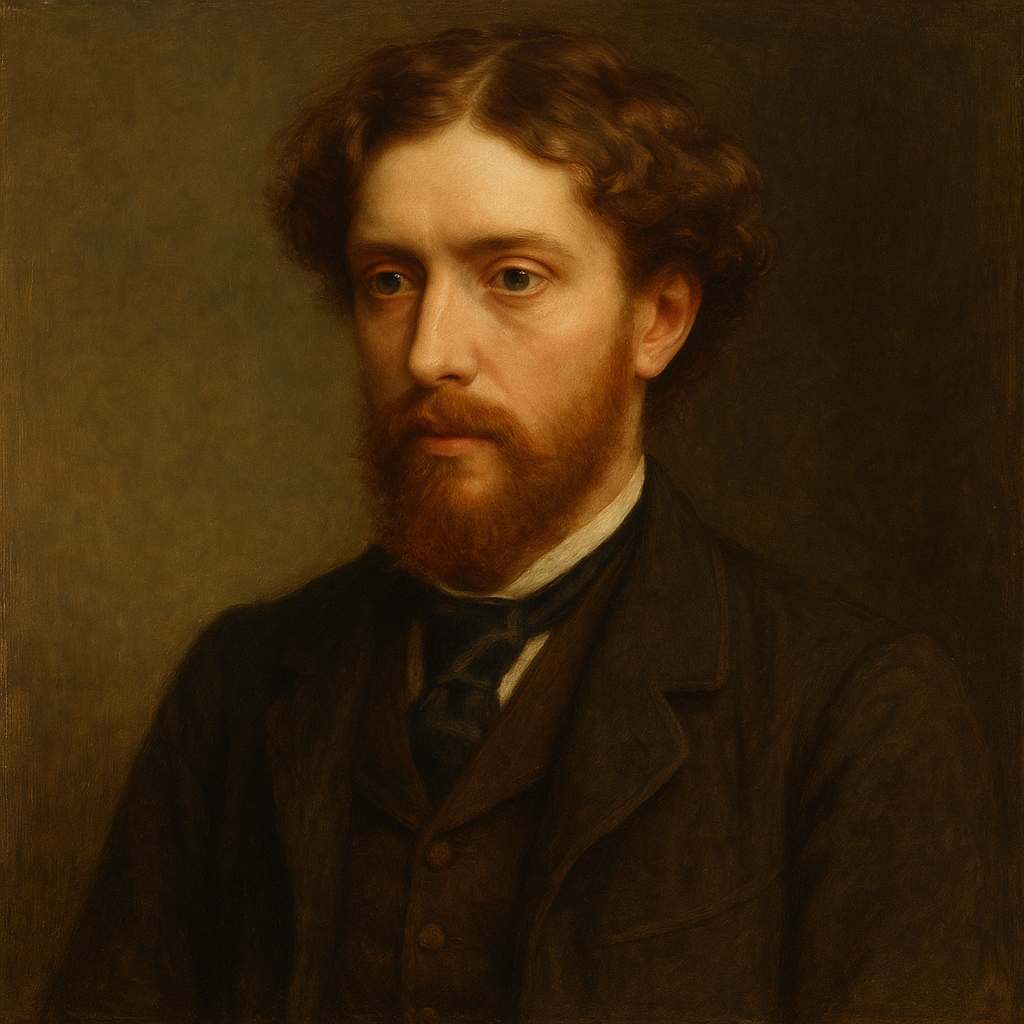Would I might go far over sea
Arthur O'Shaughnessy
1844 to 1881

Would I might go far over sea,
My Love, or high above the air,
And come to land or heaven with thee,
Where no law is and none shall be
Against beholding the most rare
Strange beauty that thou hast for me.
Alas, for, in this bitter land,
Full many a written curse doth stand
Against the kiss thy lips should bear ;
Against the sweet gift of thy hand;
Against the knowing that thou art fair,
And too fond loving of thy hair!
Arthur O'Shaughnessy's Would I might go far over sea
Arthur O’Shaughnessy’s "Would I Might Go Far Over Sea" is a poignant lyric poem that explores themes of love, escape, and societal repression. Written in the late 19th century, the poem reflects both the Romantic and Pre-Raphaelite sensibilities of its time, blending lush imagery with a yearning for transcendence beyond earthly constraints. Through its melancholic tone and evocative language, the poem captures the tension between idealized love and the oppressive forces that seek to regulate or deny it. This analysis will examine the poem’s historical and literary context, its use of imagery and structure, its thematic concerns, and its emotional resonance.
Historical and Literary Context
O’Shaughnessy (1844–1881) was a British poet associated with the aesthetic and decadent movements, though his work also bears the influence of Romanticism. Living in the Victorian era—a period marked by strict moral codes, particularly concerning love and sexuality—O’Shaughnessy’s poetry often expresses a desire to escape societal constraints. This poem, in particular, suggests a forbidden or stigmatized love, one that must flee "far over sea" or "high above the air" to exist freely.
The Victorian era was characterized by rigid social norms, where expressions of love were often governed by propriety, class, and gender expectations. The poem’s lament about "many a written curse" that stands against the beloved’s kiss and beauty may allude to societal or religious prohibitions—perhaps even laws against certain kinds of relationships (such as those outside marriage, across class divides, or between same-sex partners). The poem’s yearning for a place "where no law is and none shall be" suggests a utopian or even anarchic vision of love, free from institutional control.
Imagery and Symbolism
The poem is rich in natural and celestial imagery, which serves to contrast the idealized realm of love with the "bitter land" of reality. The opening lines—
"Would I might go far over sea,
My Love, or high above the air,"
immediately establish a dichotomy between earthbound existence and a transcendent elsewhere. The sea and the air symbolize boundless freedom, evoking Romantic notions of the sublime—vast, untamed spaces where human laws hold no power.
The beloved’s beauty is described as "strange" and "rare," suggesting that it is unconventional or misunderstood by society. The speaker’s desire to behold this beauty without restriction implies that it is something censored or forbidden in their current world. The imagery of the beloved’s hair, lips, and hands carries sensual undertones, reinforcing the idea that their love is physically as well as emotionally intimate—and thus subject to moral condemnation.
Structure and Tone
The poem’s structure reinforces its emotional weight. The first stanza presents a wishful, almost dreamlike vision of escape, while the second stanza grounds the reader in the harsh reality of prohibition. The shift from the subjunctive mood ("Would I might go") to the declarative ("Alas, for, in this bitter land") underscores the speaker’s resignation.
The repetition of "against" in the second stanza—
"Against the kiss thy lips should bear;
Against the sweet gift of thy hand;
Against the knowing that thou art fair,"
creates a rhythmic emphasis on oppression, as if each line is another chain binding the lovers. The final line, "And too fond loving of thy hair!" carries a tone of both defiance and sorrow—defiance in the speaker’s refusal to renounce their love, sorrow in the recognition that such love is condemned.
Themes: Love, Freedom, and Oppression
At its core, the poem is a meditation on the conflict between love and societal repression. The speaker’s desire to escape to a lawless realm suggests that love, in its purest form, is incompatible with the rigid structures of human society. This theme aligns with Romantic and Decadent movements, which often idealized art and emotion over moral or legal constraints.
The poem also touches on the idea of love as a form of knowledge—"the knowing that thou art fair"—implying that true appreciation of beauty (and by extension, love) is a kind of wisdom that society suppresses. This aligns with Platonic and Keatsian ideas of beauty as truth, suggesting that the beloved’s beauty is not merely physical but revelatory.
Comparative Readings
O’Shaughnessy’s poem can be fruitfully compared to other works of the period that explore forbidden love and escape. John Keats’ "Bright Star" similarly yearns for an eternal, unchanging love, while Christina Rossetti’s "Goblin Market" examines the dangers and temptations of transgressive desire. Like O’Shaughnessy, Rossetti uses lush imagery to depict a love that exists outside societal approval.
A more modern comparison might be found in W.H. Auden’s "Lay Your Sleeping Head, My Love," which also grapples with love in the face of societal judgment. Both poems suggest that love, in its most authentic form, must either defy or flee from the world’s constraints.
Emotional Impact and Philosophical Underpinnings
The poem’s emotional power lies in its juxtaposition of yearning and despair. The speaker’s fantasy of escape is undercut by the reality of their "bitter land," creating a sense of tragic inevitability. This tension between desire and limitation is universal, making the poem resonate with anyone who has experienced love thwarted by external forces.
Philosophically, the poem raises questions about the nature of freedom and the role of law in human relationships. Is love only possible beyond the reach of societal judgment? Must true beauty and affection exist in exile? The poem does not offer answers but instead lingers in the ache of these questions.
Conclusion
"Would I Might Go Far Over Sea" is a masterful exploration of love’s defiance in the face of repression. Through its evocative imagery, structured lament, and emotional depth, the poem captures the Victorian tension between private desire and public morality. O’Shaughnessy’s work remains relevant today as a testament to love’s enduring struggle against constraint—whether legal, social, or cultural. In its longing for a world "where no law is," the poem becomes not just a personal cry but a universal one, affirming poetry’s power to give voice to the deepest human yearnings.
This text was generated by AI and is for reference only. Learn more
Want to join the discussion? Reopen or create a unique username to comment. No personal details required!



Comments
No comments yet. Be the first to comment!